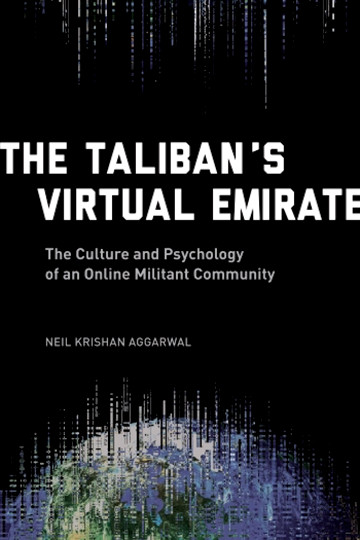Since coming to prominence in 1994, the Taliban, a fundamentalist Islamic militant group in Afghanistan, has been the subject of extensive debate among politicians, academics, social scientists, and members of the public alike. However, the evidence base for understanding the culture and psychology of the group remains limited. Studying the culture and psychology of militant groups is by no means an easy task, and the scientific literature in the field is predominantly driven by theory and opinion rather than by empirical research. Aggarwal’s book The Taliban’s Virtual Emirate: The Culture and Psychology of an Online Militant Community makes a welcome contribution to the literature in the field. Using critical discourse and analytical research, Aggarwal, a cultural psychiatrist and researcher, draws upon theories and research methods from the fields of political psychology, transcultural psychiatry, and South Asian studies to examine the Taliban’s online texts across four languages: English, Dari, Urdu, and Arabic.
Aggarwal conceptualizes the Taliban’s campaign and its associated web sites as a “virtual emirate.” He argues that the Taliban’s conception of identity can vary based on audience and context. Using Benedict Anderson’s theory of imagined community, he explains how the Taliban harnessed the Internet to present its political community to the world.
Drawing from Jerrold Post’s political personality profiling and Margaret Hermann’s seven leadership traits, Aggarwal applies a new method for psychocultural leadership assessment to analyze the leadership of Mullah Omar (the former spiritual and commanding leader of the Taliban). Omar’s attributes are presented as a strong belief in one’s ability to control events, a high need for power and influence, a capacity of conceptual complexity, a high “in-group” bias and mistrust of others, and a lack of confidence before proclaiming himself the Amir ul-Muminin (Commander of the Faithful) of the Muslim community worldwide.
Using theories from social psychology, Aggarwal argues that the Taliban’s core identity is forged through Islam but that its conception of “in-group” and “out-group” identities can vary based on audience, with an aura of nationalism in vernacular Dari, regionalism in parochial Urdu, and internationalism in cosmopolitan Arabic or English. He goes on to examine the Taliban’s conception of jihad by analyzing chronicles of casualties, interviews with Taliban officials, biographies of dead militants, expository texts on jihad, and jihadist videos. He argues that the Taliban writers “mine the wealth of languages they write in” (p. 115) and interpret canonical texts such as the Quran and Hadith (the sayings of prophet Muhammed) to glorify jihad.
Aggarwal goes on to examine international relations in the virtual emirate using the scholarship of Richard Hermann and Michael Fischerkeller that proposes five images: enemy, ally, degenerate, imperialist, and colony. He argues that the Taliban depicts the United States, Canada, France, England, and Russia as imperialist powers; Burma and Israel as enemies; the people of Egypt, Syria, and Mali as allies and their respective governments as colonies of foreign powers or enemies; and Pakistani religious scholars as allies, and the Pakistani government as an apostate.
In the concluding epilogue, Aggarwal advances his argument by discussing the utility of his method of inquiry in analyzing the culture and psychology of other militant groups, such as Al-Qaeda and the so-called Islamic State, and in developing counternarratives and countermessaging strategies to tackle these groups.
This book is well written, and the analyses presented are compelling. The book has been written with a broad audience in mind; namely, scholars in the fields of South Asian and Middle Eastern studies, cultural psychology, political science, history, and international relations. Aggarwal demonstrates an accurate understanding of the Islamic and Afghani cultural contexts. His method of inquiry is rigorous and reproducible.
However, the analyses represent an attempt to understand the Taliban’s “imagined community” (p. 17) and not its preexisting reality, which may be different and hard to reach outside discourses. Furthermore, the analyses remain subjective because researchers analyzing the same texts using different frames of reference may reach different conclusions. Conversely, researchers applying this method of inquiry to other militant groups may reach similar conclusions because the strategies used by the Taliban to present its political community bear resemblance to those used by other groups, such as Al-Qaeda, indicating that these strategies are not unique to the Taliban. In addition, the book falls short of explaining how these strategies have been influenced by the presence of Al-Qaeda in Afghanistan and by political entities that fund the Taliban. Notwithstanding these comments, this book makes a valuable contribution to the literature in the field.


